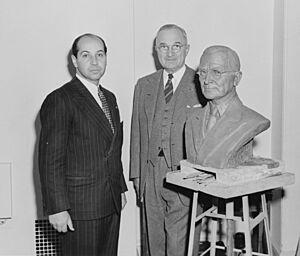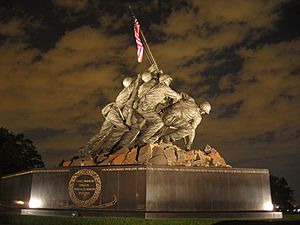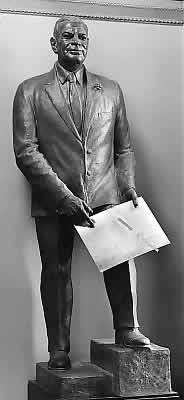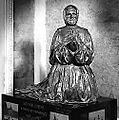Felix de Weldon facts for kids
Quick facts for kids
Felix de Weldon
|
|
|---|---|

De Weldon with President Harry S. Truman in 1949
|
|
| Born |
Felix Weihs de Weldon
April 12, 1907 Vienna, Austria-Hungary
|
| Died | June 3, 2003 (aged 96) Washington, D.C., U.S.
|
| Resting place | Arlington National Cemetery |
| Nationality | American |
| Education | Marchetti College (AB) University of Vienna (MA, MS, PhD) |
| Occupation | Sculptor |
| Children | 2 |
Felix Weihs de Weldon (born April 12, 1907 – died June 3, 2003) was a famous American sculptor. He created many well-known artworks. His most famous pieces include the United States Marine Corps War Memorial (Iwo Jima Memorial, 1954) in the Arlington National Cemetery, Virginia, USA. He also created the Malaysian National Monument (1966) in Kuala Lumpur.
Biography of Felix de Weldon

Felix de Weldon was born in Vienna, Austria-Hungary, on April 12, 1907. He went to St. Egichin's Grammar School for his early education. In 1925, he earned a degree from Marchetti College. He later earned his Master's and PhD degrees from the University of Vienna's Academy of Creative Arts and School of Architecture.
De Weldon first became known as a sculptor when he was just 17 years old. He created a statue of an Austrian educator named Professor Ludo Hartman. In the 1920s, he joined groups of artists in France, Italy, and Spain. Later, de Weldon moved to London, where he received many requests for his art. One important work was a portrait sculpture of King George V.
A significant trip to Canada to sculpt Prime Minister Mackenzie King brought de Weldon to North America. He decided to live in the United States in 1937. During World War II, de Weldon joined the United States Navy. He became a United States citizen in 1945.
In 1950, President Harry Truman asked de Weldon to join the U.S. Commission of Fine Arts. This is a group that advises the government on art. He was asked to serve again by President Dwight Eisenhower in 1956 and by President John F. Kennedy in 1961. In 1959, he received an honorary knighthood for his work for the British Crown.
Felix de Weldon passed away on June 3, 2003, at the age of 96, in Washington, D.C.. He was buried in Arlington National Cemetery.
Famous Sculptures by De Weldon
Felix de Weldon created about 1,200 sculptures. These artworks are located in many different countries around the world. For example, one of his monuments honoring Richard Evelyn Byrd is in Antarctica.
After World War II ended in 1945, the Congress of the United States asked de Weldon to create a statue. This statue would become the Marine Corps War Memorial, also known as the Iwo Jima Memorial. It was based on the famous photograph by Joe Rosenthal. This photo showed six servicemen raising the American flag on Mount Suribachi during the Battle of Iwo Jima.
De Weldon sculpted three of the flag-raisers from real life. The other three flag-raisers had died during the battle, so he used photographs to sculpt them. It took de Weldon nine years to complete this memorial. Many other sculptors helped him. The finished statue is made of 100 tons of bronze and is located in Arlington, Virginia.
De Weldon also helped create Malaysia's Tugu Negara (National Monument). Malaysia's first Prime Minister, Tunku Abdul Rahman, saw the Marine Corps War Memorial during a visit to America in 1960. He personally asked de Weldon to design Malaysia's monument. De Weldon later received a special title, Tan Sri, which is like a high-ranking knighthood in Malaysia.
Images for kids
-
Iwo Jima Memorial - Arlington, Virginia
-
Richard Evelyn Byrd memorial, McMurdo Station. (Copy of same in Arlington Cemetery)
-
Simon Bolivar equestrian statue, Washington, DC
-
De Weldon (left) presents his bust of U.S. Navy Admiral of the Fleet Chester W. Nimitz to the Naval War College on 5 June 1964. President of the Naval War College Vice Admiral Bernard L. Austin (center) and retired U.S. Marine Corps Lieutenant General Keller E. Rockey look on.
-
Felix de Weldon at the Marine Memorial dedication at Belleau Wood.













